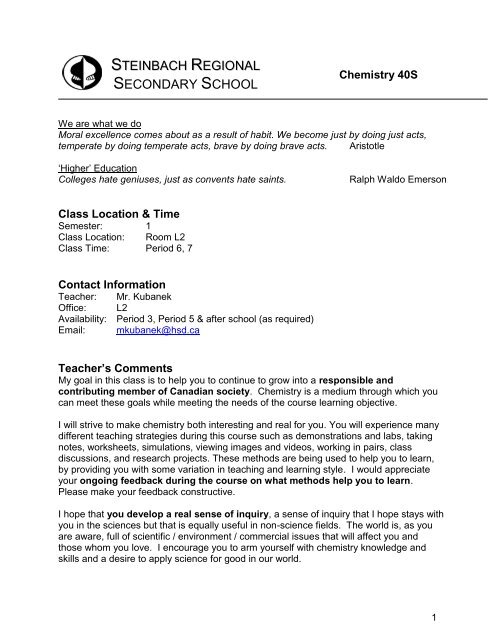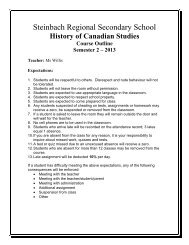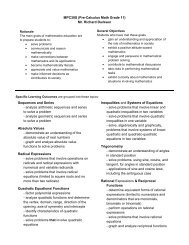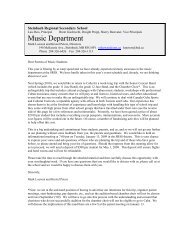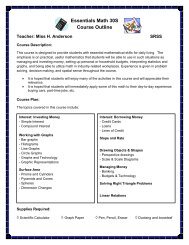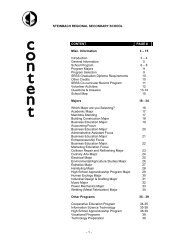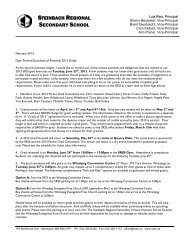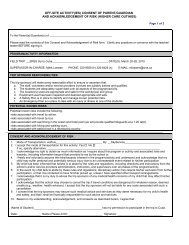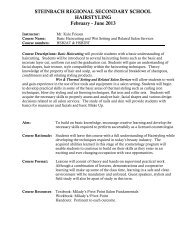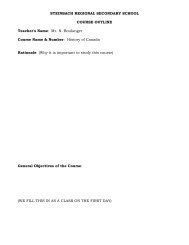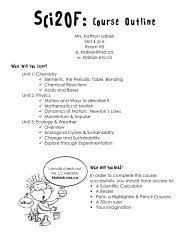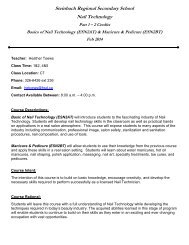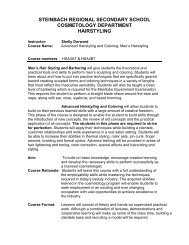ISO 9001:2000 Certification Process Management Meeting Agenda
ISO 9001:2000 Certification Process Management Meeting Agenda
ISO 9001:2000 Certification Process Management Meeting Agenda
You also want an ePaper? Increase the reach of your titles
YUMPU automatically turns print PDFs into web optimized ePapers that Google loves.
STEINBACH REGIONAL<br />
SECONDARY SCHOOL<br />
Chemistry 40S<br />
We are what we do<br />
Moral excellence comes about as a result of habit. We become just by doing just acts,<br />
temperate by doing temperate acts, brave by doing brave acts. Aristotle<br />
‘Higher’ Education<br />
Colleges hate geniuses, just as convents hate saints.<br />
Ralph Waldo Emerson<br />
Class Location & Time<br />
Semester: 1<br />
Class Location: Room L2<br />
Class Time: Period 6, 7<br />
Contact Information<br />
Teacher: Mr. Kubanek<br />
Office: L2<br />
Availability: Period 3, Period 5 & after school (as required)<br />
Email: mkubanek@hsd.ca<br />
Teacher’s Comments<br />
My goal in this class is to help you to continue to grow into a responsible and<br />
contributing member of Canadian society. Chemistry is a medium through which you<br />
can meet these goals while meeting the needs of the course learning objective.<br />
I will strive to make chemistry both interesting and real for you. You will experience many<br />
different teaching strategies during this course such as demonstrations and labs, taking<br />
notes, worksheets, simulations, viewing images and videos, working in pairs, class<br />
discussions, and research projects. These methods are being used to help you to learn,<br />
by providing you with some variation in teaching and learning style. I would appreciate<br />
your ongoing feedback during the course on what methods help you to learn.<br />
Please make your feedback constructive.<br />
I hope that you develop a real sense of inquiry, a sense of inquiry that I hope stays with<br />
you in the sciences but that is equally useful in non-science fields. The world is, as you<br />
are aware, full of scientific / environment / commercial issues that will affect you and<br />
those whom you love. I encourage you to arm yourself with chemistry knowledge and<br />
skills and a desire to apply science for good in our world.<br />
1
Course Content<br />
Each unit will include a unit plan outline, an introduction, notes, explanations,<br />
demonstrations / labs / simulations, worksheets, quizzes, a unit review, and a unit test.<br />
The tentative unit test schedule is as follows (Note that the schedule is based upon daily<br />
classes of 65 minutes and is subject to change to accommodate unplanned events and<br />
student needs.):<br />
Topic # Topics<br />
Time<br />
(hours)<br />
Introduction 3<br />
1 Atomic Structure<br />
15<br />
& Chemical Bonding<br />
2 Kinetics 15<br />
3 Equilibrium 23<br />
4 Acids and Bases 15<br />
5 Electrochemistry 10<br />
Exam Review 3<br />
Exam<br />
The following gives you an outline of some of the key issues covered in each of the six units.<br />
1. Atomic Structure - Chemical Bonding - Thermochemistry<br />
Atomic Structure: historical development of atomic structure, the Quantum<br />
Mechanical Model, electron configurations, periodic table properties<br />
Bonding: Ionic and covalent bonding, electro-negativity and bond dipoles, shapes<br />
of molecules and molecular polarity<br />
Thermochemistry: exothermic & endothermic reactions, Hess’s Law (heats of<br />
reaction), bond energy, spontaneous & non-spontaneous reactions, entropy (a<br />
measure of disorder), Gibb’s free energy.<br />
2. Kinetics<br />
Scope: collision theory, factors which affect the rate of chemical reactions,<br />
activation energy and heat of reaction, reaction mechanisms<br />
3. Equilibrium<br />
Scope: The nature of equilibrium, the equilibrium constant, Le Chatelier’s<br />
Principle, solubility rules, solubility equilibrium<br />
4. Acids and Bases<br />
Scope: the Arrhenius definition, the Bronsted-Lowry definition, pH, acid-base<br />
neutralization, dissociation, titration<br />
5. Electrochemistry<br />
Scope: redox reactions, activity series, voltaic (galvanic) cells, electrode<br />
potential, voltaic vs. electrolytic cells, corrosion<br />
2
What to bring each day<br />
An inquiring mind that is ready & wanting to learn / challenge / explore<br />
Periodic Table & other reference tables (as the teacher gives them to you)<br />
Calculator<br />
Bring the text, Glencoe: Chemistry Matter and Change (2008), on unit review days.<br />
Learning<br />
My job is to teach you. I will work hard to help you to learn. Remember that I am not<br />
responsible for your learning. You are! Here are a few suggestions:<br />
You are expected to keep up with and learn the material as we cover it in class.<br />
You will learn more if you listen to me when I am talking. That means that when I<br />
am talking, you will need to listen to me; it also means that we all listen to<br />
students who are asking questions and participating in class talks. I strongly<br />
suggest that you sit with a student who will help you to learn.<br />
You will improve your work habits and science knowledge / skills by practicing.<br />
All worksheets (WS) are for your practice. I will post answers to worksheets at<br />
the back of the classroom.<br />
We will have unit review classes before a test.<br />
Attendance<br />
Attendance in this course is important. To learn, you need to be in class & be involved<br />
in your learning.<br />
You are to arrive in class on time. If you arrive late, expect to be marked late. Also,<br />
complete a ‘Student Late to Class’ form. Do not interrupt the class and explain why you<br />
are late. We can discuss that later.<br />
If you are late or miss a class, it is your responsibility to get notes / handouts /<br />
assignments. Complete your notes & get help from a friend, then ask me whatever<br />
questions you may have.<br />
Late Work<br />
Just like in the real world, it matters both that you do good quality work (i.e. your best<br />
effort) and that your work is completed on time. The work that I ask you to do is<br />
designed to help you to learn. It matters that you do it when I ask you to do it. There is<br />
little value in completing assigned work weeks or months after the due date. Your<br />
learning opportunity has been missed. I have a few suggestions for you:<br />
Keep track of your completed work on the ‘Assessment List’.<br />
If you are done your work early, hand it in early.<br />
3
If you know that your work is going to be late (e.g. school band trip), complete<br />
a ‘Student Late Work’ form (a pink form). It is your responsibility to work out a<br />
plan with me to catch up on any late work.<br />
Late labs, projects, assignments and worksheets will be penalized 10%.<br />
All assignments / labs / projects must be handed in for assessment before<br />
the end of the following unit or you will have earned a zero on that<br />
assessment.<br />
Work that is late due to absences will be handled as follows:<br />
If you know you will be absent, tell me ahead of time.<br />
If your absence is unexpected, see me the day you return to make<br />
arrangements regarding late and missed work.<br />
Be prepared to write a missed test on your second day back in class.<br />
Some students skip or ‘get sick’ on test days. This is not a good idea. If you skip class on<br />
the day of a test, you have earned the right to complete a different test.<br />
Note: the students who are ‘sick’ on the test day almost always do worse on their tests.<br />
So, so not procrastinate.<br />
Assessment<br />
Remember that I can only assess work that you give to me, so submit work that reflects<br />
your best effort and hand it in on time.<br />
I have put together a tentative list of assignments / labs / projects / tests that you will<br />
need to complete. You will be informed of work that I will take in for assessment.<br />
Assigned work will be due three days after you have time to complete the work,<br />
e.g. if the lab is completed on Tuesday, it will be due on Friday of that week. Stay<br />
caught up!<br />
I will post your marks & completed / outstanding work as we progress through the<br />
semester.<br />
The term is worth 75% and the final exam is worth 25%. The term evaluation is as<br />
follows (varies by unit):<br />
Daily Challenge 10-15%<br />
Labs – Quizzes - Projects - Assignments - Worksheets 30-50%<br />
Unit Tests 40-60%<br />
Learning is about constantly improving, learning more, and improving your skill. That<br />
means that you need to keep learning as you go through this course. This approach to<br />
learning is reflected in the importance of making an effort to do well on the final exam.<br />
4
A few closing comments<br />
If you are gifted in this course …<br />
Help other students.<br />
Sit beside someone who you can help.<br />
Do not socialize in class with students who are struggling to survive in this course.<br />
Help them!<br />
If you are not so gifted in this course …<br />
Sit close to a ‘brainiac’ and get them to help you to learn.<br />
Remember that you are responsible for your learning.<br />
In order to learn, you need to attend class, be involved, and do your practice work.<br />
FAQ’s<br />
What did we do yesterday?<br />
Do not ask me this question.<br />
Go to the folder for the unit that we are working on; look at the back of the folder<br />
for any handouts that you do not have.<br />
Borrow notes from a reliable student & complete your notes.<br />
After you do all of this, come and ask me whatever questions you have.<br />
When is the assignment / lab / project due?<br />
Ask the student beside you or check the ‘Assessment List’.<br />
Where is the stapler / hole punch / calculator?<br />
Stapler: on the window ledge & at the front-right of the room.<br />
Hole punch: at the front right of the room.<br />
Pencil sharpener: at the front-right of the room & on the right side of the room.<br />
Calculators: at the front-right of the room.<br />
Why did I bomb that test?<br />
You might want to think about changing some bad habits.<br />
Take clear notes & seek to understand what we did in class each & every day. Are<br />
both your notes & solutions to problems clear enough that you will understand<br />
them in a few months when you are trying to use them to prepare for the exam?<br />
Do you review your notes every night to make sure that they make sense?<br />
Do you do your practice work? Practice is something that we do in the real world. It is<br />
hard to get better at anything without practicing it. The same goes for school work.<br />
Did you ask questions whenever you didn’t understand something? You should<br />
ask questions. There are worse things than being a ‘keener’. By the way, I do not<br />
bite off the heads of inquiring minds.<br />
Did you study?<br />
Did you study just before the test or 1-2 days before the test so that you had time<br />
to ask another student or the teacher a question or two?<br />
5


